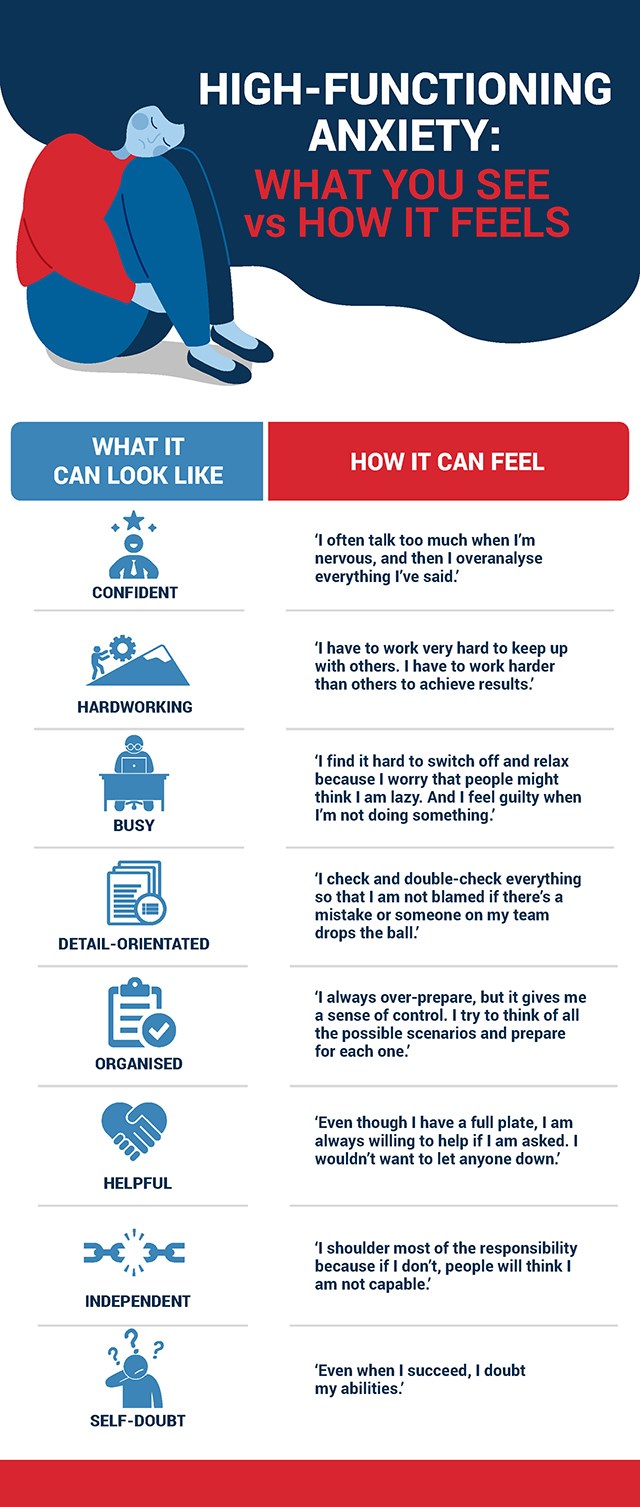What is high-functioning anxiety?

Perhaps you think nothing of your high-functioning anxiety because you’ve never missed a deadline and you appear to be winning at life, but this specific kind of anxiety can lead to a more serious mental health condition. Here’s what you need to know.
High-functioning anxiety is a condition where anxiety drives a person to achieve success. Despite rising levels of anxiety and mental health struggles during the height of lockdown, fear propelled some people forward instead of leaving them paralysed. Many of these people are living with high-functioning anxiety. While the condition is not recognised as an official mental health diagnosis, and might not cause clinically significant impairment, high-functioning anxiety is an internal struggle that can disrupt daily life and relationships.
What are high-functioning anxiety symptoms?
On the surface, the person seems to excel at life. They never miss a deadline and appear calm and together, but what you see is very different from how the person feels. See the infographic below, which demonstrates that a cool exterior can be masking a very different reality.



Often the person dismisses their symptoms as simply the way a perfectionist or overachiever approaches life. They are the first person at work in the morning and the last person to leave, but while their life appears as well ordered as their to-do list, there’s an underlying anxiety that’s telling them that they are not good enough unless they do more.
The pros and cons of anxiety
While it’s easy to admire a person that’s outgoing, punctual, organised, detail-orientated and loyal, this sometimes comes at great risk to the person’s mental wellbeing. People with high-functioning anxiety also display these negative traits:
- a tendency to talk or chatter nervously
- being desperate to please everyone, fearing rejection
- overthinking every situation and action
- dwelling on the negative
- insomnia because of a racing mind
- mental and physical fatigue
- potential for alcohol or substance abuse
How to overcome high-functioning anxiety
1. Be self-aware
Recognise the symptoms and try to understand their impact. Don’t be afraid to get professional help if the anxiety affects your ability to function daily.
2. Fear is not the enemy
Name and acknowledge the fear. Try not to feed fear with anxiety. Confront the issues and work towards identifying the triggers so you can decisively deal with them.
3. Explore the body-mind connection
When you’re feeling overwhelmed and stuck in an endless loop of negativity, go for a walk, exercise, dance to your favourite song, or practise deep breathing or yoga and give your mind a break.
Disperse the negative energy through movement to avoid it getting stuck in your body and manifesting as anxiety.
4. Create daily affirmations
These mantras can be used to drown out the negative internal dialogue.
Here are a few suggestions:
- ‘I am doing the best I can.’
- ‘I am enough. I am not perfect, but I am enough.’
- ‘I deserve to take better care of myself.’
5. Find support
There is strength in numbers. Nobody should have to struggle alone. When you find a few people you can trust, confide in them, and ask them to help you when you feel overwhelmed.
If your anxiety starts to feel unmanageable, consult a qualified mental health professional. There is no need to struggle in silence. Get the help you need and start to create a new reality for your life.
The information is shared on condition that readers will make their own determination, including seeking advice from a healthcare professional. E&OE. Life Healthcare Group Ltd does not accept any responsibility for any loss or damage suffered by the reader as a result of the information provided.

